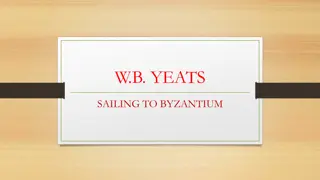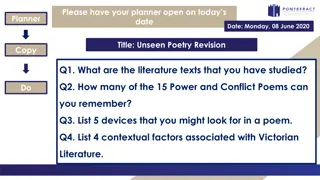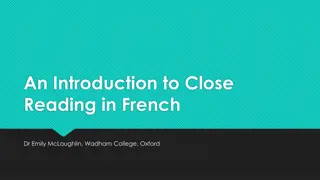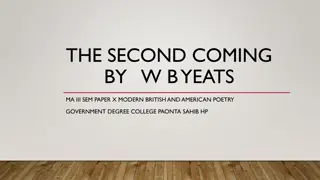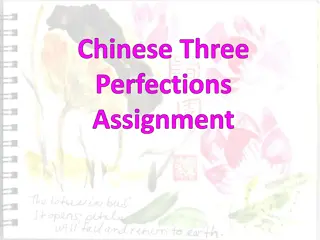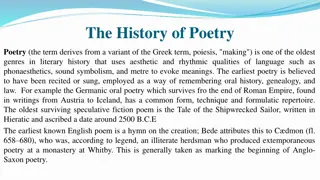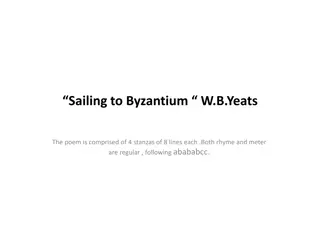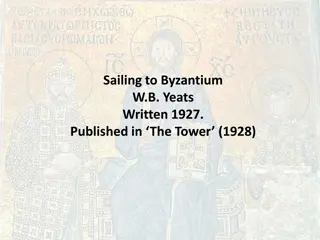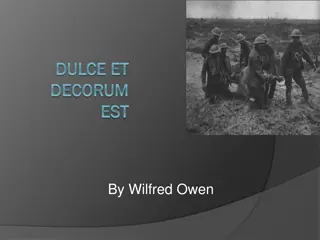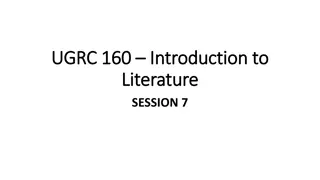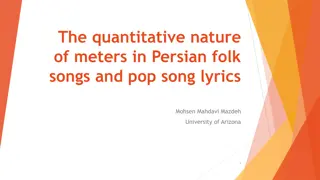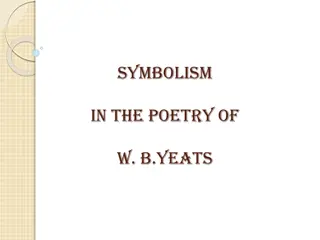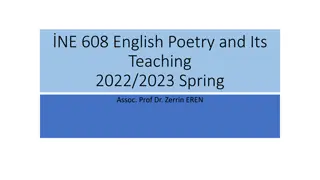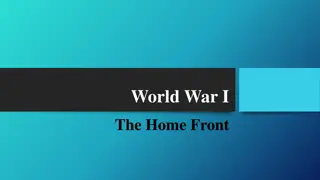Analysis of W.B. Yeats' Poetry During World War I
W.B. Yeats' poetry during World War I reflects a unique perspective on the conflict, as seen in works like "An Irish Airman Foresees His Death" and "On Being Asked for a War Poem." Delving into themes of sacrifice, duty, and the futility of war, Yeats offers a contrasting view to the graphic realism of War Poets like Wilfred Owen. His elegy for Major Robert Gregory also sheds light on personal connections to the war and the impact on individuals.
Download Presentation

Please find below an Image/Link to download the presentation.
The content on the website is provided AS IS for your information and personal use only. It may not be sold, licensed, or shared on other websites without obtaining consent from the author. Download presentation by click this link. If you encounter any issues during the download, it is possible that the publisher has removed the file from their server.
E N D
Presentation Transcript
An Irish Airman foresees his Death W.B. Yeats - Written 1918. Published in The Wild Swans at Coole (1919)
On being asked for a war poem (1915) I THINK it better that in times like these A poet keep his mouth shut, for in truth We have no gift to set a statesman right; He has had enough of meddling who can please A young girl in the indolence of her youth, Or an old man upon a winter s night. It is the only thing I have written of the war or will write, so I hope it may not seem unfitting. WB Yeats A Reason for Keeping Silent Original Title
An Irish Airman foresees his Death (1918) I KNOW that I shall meet my fate Somewhere among the clouds above; Those that I fight I do not hate Those that I guard I do not love; My country is Kiltartan Cross, My countrymen Kiltartan s poor, No likely end could bring them loss Or leave them happier than before. Nor law, nor duty bade me fight, Nor public man, nor cheering crowds, A lonely impulse of delight Drove to this tumult in the clouds; I balanced all, brought all to mind, The years to come seemed waste of breath, A waste of breath the years behind In balance with this life, this death. 5 10 15
The poem is an elegy for Major Robert Gregory RFC, MC, Legion of honour who was KIA on Jan 23rd, 1918. He was the son of Lady Gregory who was a patron and friend of Yeats. (See notes on September 1913 and The Wild Swans at Coole.) The poem is an imagining of the airman s thoughts just before he dies. It is a monologue that is distanced literally and metaphorically from the mud, blood and actuality of the War Poets. Yeats disliked Wilfred Owen s poetry explaining passive suffering is not a theme for poetry and excluding him from The Oxford Book of Modern Verse that Yeats edited.
Bent double, like old beggars under sacks, Knock-kneed, coughing like hags, we cursed through sludge, Till on the haunting flares we turned our backs, And towards our distant rest began to trudge. Men marched asleep. Many had lost their boots, But limped on, blood-shod. All went lame, all blind; Drunk with fatigue; deaf even to the hoots Of gas-shells dropping softly behind. Gas! Gas! Quick, boys! An ecstasy of fumbling, Fitting the clumsy helmets just in time, But someone still was yelling out and stumbling And floundering like a man in fire or lime. Dim through the misty panes and thick green light, As under a green sea, I saw him drowning. In all my dreams, before my helpless sight, He plunges at me, guttering, choking, drowning. Q. This is Owen s poem Dulce et Decorum Est (1917). How is this very different from the world of the Irish Airman? If in some smothering dreams, you too could pace Behind the wagon that we flung him in. And watch the white eyes writhing in his face, His hanging face, like a devil's sick of sin; If you could hear, at every jolt, the blood Come gargling from the froth-corrupted lungs, Obscene as cancer, bitter as the cud Of vile, incurable sores on innocent tongues, My friend, you would not tell with such high zest To children ardent for some desperate glory, The old Lie: Dulce et decorum est Pro patria mori.
I wandered lonely as a Cloud That floats on high o'er vales and Hills, When all at once I saw a crowd, A host, of golden Daffodils; Beside the Lake, beneath the trees, Fluttering and dancing in the breeze. Continuous as the stars that shine And twinkle on the milky way, They stretched in never-ending line Along the margin of a bay: Ten thousand saw I at a glance, Tossing their heads in sprightly dance. Q. This is Wordsworth s poem I wandered lonely as a cloud (1815). How is this very different from the world of the Irish Airman? The waves beside them danced; but they Out-did the sparkling waves in glee:- A Poet could not but be gay In such a jocund company: I gazed---and gazed---but little thought What wealth the show to me had brought: For oft when on my couch I lie In vacant or in pensive mood, They flash upon that inward eye Which is the bliss of solitude, And then my heart with pleasure fills, And dances with the Daffodils.
the airman is symbolic of the subjective or philosophical life. He accounts for his reason why he fights and achieves a kind of tragic balance. (Greening 2005) Illustrates Yeats s growing political consciousness Wordsworth s poetry reveals the power of the mind over the body. Wordsworth relieves his isolation through the restorative power of nature. His Leech Gatherer perseveres through the simple exertion of his will. This independence is ensured through individual resolution a democratic and empowering form of liberty. Richard Ellmann Yeats: The Man and the Mask (1985) My whole life I have lived in pleasant thought As if life s business were a summer mood As if all needful things would come unsought To genial faith, still rich in genial good William Wordsworth Resolution and Independence (1807) Q. Write a short paragraph explaining how each of these quotes relate or help contextualise your understanding of the poem An Irish Airman...


